Environmental Stewardship

Many years ago, I sat in a church that resembled nothing like the church that I barely frequented while growing up. As the overhead lights dimmed in preparation for opening song, a blue-ish red hue washed over the stage to what felt like a concert opening and the following lyrics for “Indescribable” emerged on two oversized screens flanking the worship team:
From the highest of heights to the depths of the sea
Creation’s revealing Your majesty
From the colors of fall to the fragrance of spring
Every creature unique in the song that it sings
All exclaiming …
These song lyrics stuck with me because they remind me of how God is manifest in our natural world, where grace and interconnectedness are reflected in species that are intricately dependent on one another, and where the sheer beauty of our earth often becomes more apparent when we are able to step away from our industrialized lives and behold a starry night or a hike in the woods.
These lyrics also remind me of the part in Genesis where Adam is first put in charge of taking care of Eden and then gets to name all the animals, implying that he is responsible for them too:
“The Lord God took the man and put him in the Garden of Eden to work it and take care of it … Now the Lord God had formed out of the ground all the wild animals and all the birds in the sky. He brought them to the man to see what he would name them; and whatever the man called each living creature, that was its name. So the man gave names to all the livestock, the birds in the sky and all the wild animals …” (Gen 2:15; 19-20).

In these days barren fields will sprout trees
The deaf and blind will hear and see
The dead will raise and begin to breathe
The earth will groan in pain to see
The sons of God declare to be
His full and glorious family
The beautiful, perfect bride of Thee (Wash Me Clean, Page CXVI)
I am a city girl through and through — I’ve never lived outside of an urban context. Although my family lived in Queens (represent!), our church and community were in the dense and often treeless “ghetto” of Alphabet City, a neighborhood on the Lower East Side of Manhattan. My experiences of nature have mostly consisted of front and back yards, parks, and occasional trips to the beach or camping. And because I grew up in and spent most of my life in communities of the poor and marginalized, most of my experiences of God have centered around what Divine mercy, justice, healing, liberation, and restoration look like in the human heart.
In other words, it’s very easy for me to grasp the idea of a “New Jerusalem” or “a city whose architect and builder is God.” It’s easy for me to see the human component of God’s kingdom and what it means for people. It’s not so easy for me to imagine trees “clapping their hands” or even fully to appreciate the majesty of God’s handiwork in the stars ... because I’ve rarely seen a night sky free from light pollution. It’s not easy for me to imagine what a renewed creation would look like apart from new hearts and restored people.
BETWEEN 6:30 AND 7 nearly every morning, a dark rumble drifts up through the chilled air from the railroad tracks at the bottom of our hayfield in the Adirondack foothills of New York. A line of more than 100 black tanker cars, mostly full of fracked Bakken oil from North Dakota, rolls southward. They will pass the field where our neighbor’s kids play, then close alongside beautiful Lake Champlain, which defines this region, and on to Albany, where the oil will be put on barges and floated down the Hudson River to New Jersey, to be stored or refined.
Tanker cars like these have been blowing up recently. An accident north of us, over the Canadian border, flattened a downtown and killed 47 people. These cars carry a mix of crude oil and volatile compounds arising from the fracking process, making them dangerously flammable. I worry about my small town’s volunteer fire fighters, all of whom I know personally and admire greatly, who do not have the expertise or the equipment to deal with an accident like that.
Watching the tanker cars, I am also haunted by a scene seared into my memory five months ago. We are driving east along U.S. Route 2 in North Dakota, our small camper in tow, trying to pass through Williston, smack in the middle of the Bakken oil fields.
As the sun sets, we see hundreds of oil and gas rigs flaring excess volatile gases in huge plumes of orange flame. Processing plants spew fumes of God-knows-what. There are row upon row of metal trailers, boxes really, actually used as housing for people. Unrelenting traffic beats a path on the undivided highway under furious construction, with no breakdown lanes or turn-offs for miles. Huge water tankers and oil trucks force us to move onward at 60 mph; there will be no rest for us here, as all campgrounds, gas stations, and parking lots are filled with the rigs of the temporary workers.

ON JUNE 2, Environmental Protection Agency administrator Gina McCarthy announced the next phase in the Obama administration’s war on carbon pollution. The Clean Power Plan aims to reduce carbon-dioxide emissions from existing fossil-fuel power plants (the largest source of carbon pollution in the U.S.) 30 percent by 2030. That same day the stock market closed with record highs, and more than 173 companies and investors sent a letter to President Obama in support. Business understands that these regulations are good for long-term economic health.
State governments have welcomed the new plan because while the carbon limits are fixed, the path to achieving them is flexible. It allows both “rate-based” and “mass-based” methods of reduction, something unusual for the EPA, thus allowing some states to target specific industries and others to aim for overall carbon reductions. Catholic social teaching includes the principle of “subsidiarity”—let the most competent authority closest to the problem determine what works best in achieving a common-good goal. The Clean Power Plan that McCarthy, a Catholic, has rolled out does that. Yet it’s not enough and it’s not fast enough to beat our ecological endgame.
President Obama has pledged to reduce U.S. greenhouse gas emissions 17 percent below 2005 levels by 2020. To this end, he has 1) steadily increased car and truck fuel-economy standards; 2) required permits and set strict emission standards on all new fossil-fuel power plants; and 3) taken smaller, interlocking steps, such as establishing wind and solar renewable energy production on public lands, working with China to phase out hydrofluorocarbons, and significantly restricting funding from U.S. foreign aid agencies for new coal plants in other countries. This fall he may launch a low-intensity war on methane pollution from fracking and landfills. It’s not enough. There are too many loopholes.


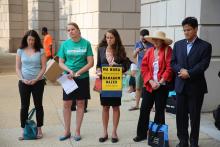
This week began in song and prayer outside the Environmental Protection Agency.
The government employees walking past our prayer circle definitely thought we were unusual; for Sojourners, though, publicly witnessing to our calling as Christians in care for creation is just another day on the job. We gathered with interfaith partners for a morning blessing to kick off the EPA’s hearings on the Clean Power Plan – an ambitious plan to curb carbon emissions from our largest source, power plants. Our goal was to show EPA and the nation that people of faith care deeply about what human sin has done to creation, and how all of God’s creation – including people – are suffering and will continue to suffer from climate change.
The next day, I was back at the EPA, this time to offer my testimony during their second day of hearings.

The Supreme Court’s Citizen’s United case infamously affirmed money spent in political campaigns as a form of free speech, thus declaring various legal limitations unconstitutional. The ruling gives a political megaphone to those with the most money and has been decried by many as contributing further to the nation’s political dysfunction and rigid polarization. I strongly agree.
But this ruling came to mind again when I heard the news that the World Council of Churches, at its Central Committee meeting in early July, had made a decision not to invest in fossil fuel industries. In fact, money does talk. Where institutions place their invested funds is not a neutral, pragmatic matter. It speaks volumes.

Worried about global warming, a growing number of churches and other faith groups are divesting their holdings in fossil fuel companies, which release large amounts of carbon dioxide and other greenhouse gases into the atmosphere.
“The warning in Scripture that ‘the wages of sin is death’ could not be more literally true than it is in the case of fossil fuels,” said Serene Jones, president of New York’s Union Theological Seminary, whose board voted in June to divest its $108.4 million endowment from fossil fuel companies.
“While we realize that our endowment alone will hardly cause the fossil fuel giants to miss even half a heartbeat, as a seminary dedicated to social justice we have a critical call to live out our values in the world. Climate change poses a catastrophic threat, and as stewards of God’s creation we simply must act.”
THE NEWS IN mid-May was grim: Scientists announced that melt across the West Antarctic was proceeding much faster than before. In fact, they said that at this point the melt of the six great glaciers fronting Amundsen Bay was “unstoppable,” and that over a number of decades it would raise sea levels by 10 feet or more.
This is another way of saying: Given dominion over the earth, we’ve failed. We’ve taken one after another of the planet’s great physical features and wrecked them. The Arctic? Summer sea ice is reduced by 80 percent, and it’s an every-year affair now to boat through the Northwest Passage, impassably choked by ice until this millennium began. The seven seas? Thirty percent more acidic than they were in the past—and the acidity could double or triple by the end of the century. The Antarctic? It’s not just warming rapidly, but its wind patterns have been changed by the ozone hole in ways that amplify the heating. Storms are stormier, droughts are deeper, fires last longer, rain falls harder.
And all because it was a little easier and a little cheaper not to change off fossil fuels. When scientists sounded the alarm about all this in the late 1980s, the atmospheric concentration of carbon dioxide was about 350 parts per million—or what we now consider the upper bound of safety. If we’d heeded their fervent warnings, we’d have moved with great speed to convert to solar and wind power. We’d have parked our SUVs. We’d have insulated every home in the world. It would have cost money and it would have been inconvenient; on the other hand, it could have bred solidarity in much the same way that preparing for World War II transformed the U.S.

Another Christian school moves to divest – this time, a Catholic university
Just one week after Serene Jones, President of Union Theological Seminary, announced their decision to become the world’s first seminary to divest from fossil fuels, another first announced. The University of Dayton, a Catholic, Marianist university, will divest fossil fuels from its $670 million investment pool. This is the first Catholic university in the world to do so.
Just as divestment makes sense for Union Theological Seminary and its history of engaging social justice, this choice is in line with Catholic social teachings and the Marianist values of leadership and service to humanity. Marianists view Mary, the mother of Jesus, as their model of discipleship, and their mission is to bring Christ into the world and work for the coming of Christ’s kingdom.
Union and the University of Dayton are the newest schools joining the growing list of U.S. colleges and universities divesting from fossil fuels as a way to stop financially supporting the climate pollution and the public health implications of coal, oil, and natural gas as the dominant sources of energy in the country. Their announcements are unique because they speak not only of the moral choice, but of the Christian choice on matters of financial investment.
At the Presbyterian Church (USA) General Assembly this past week, in addition to the denomination’s decision to divest from three companies in relation to conflict in Israel/Palestine, a decision was made to begin the discernment process on fossil fuel divestment. The fossil fuel divestment conversation is happening in many churches and religious institutions across the country, and Union Theological Seminary and the University of Dayton are clear that they see this as an act of Christian witness for protecting God’s creation and people.
Information is from The University of Dayton’s website.
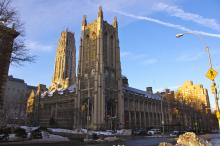
Last week, Serene Jones, president of Union Theological Seminary, announced that the school is divesting its endowment of fossil fuels. It is the first seminary in the world to do so, marking Union’s latest action in a long legacy of social justice commitments.
So what? Well, it helps to look at this news in context.

New York City’s venerable Union Theological Seminary plans to pull all investments in fossil fuels from its $108.4 million endowment, casting it as part of a bid to atone for the “sin” of contributing to climate change.
Union’s portfolio has been investing 11 percent (or about $12 million) of its endowment in fossil fuels. Jones did not mince words in condemning the school’s contributions to fossil fuel, quoting “the wages of sin is death” from Scripture.
“We have sinned, and we see this divestment as an act of repentance for Union,” Jones wrote in an op-ed for Time magazine. “Climate change poses a catastrophic threat. As stewards of God’s creation, we simply must act to stop this sin.”
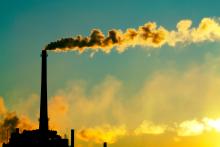
How refreshing to see Roman Catholic Archbishop Thomas Wenski’s May 29 letter to EPA Administrator Gina McCarthy urging that the new carbon pollution rules on existing power plants should “protect the health and welfare of all people, especially children, the elderly, as well as poor and vulnerable communities from harmful pollution emitted from power plants and from the impacts of climate change.” The Miami archbishop was speaking on behalf of the U.S. bishops in his role as chairman of the U.S. bishop’s Committee on Domestic Justice and Human Development.
Since last Monday and even in the months leading up to the release of the new EPA rules governing carbon pollution, there’s been a battle royale in the media and the blogosphere between the fossil fuel industry (and their supporters) and the environmentalists (and their proxies).

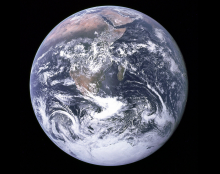
Political talk of moral obligation almost always invokes future children; it is not politically controversial to hope that our children and grandchildren will live on a safe planet. But the moral dimensions of climate change are far more complex and granular: food shortages here, extreme weather events there, floods that displace people in coastal regions, melting polar icecaps causing increased extinctions, the vulnerability of the global poor.
A moral vision able to see these granular risks comes, I would argue, not from time (Obama’s “future children” or the Pope’s “Creation will destroy us”), but from space.
Since 1946, the modern world has been able to view images of the earth from space. Some four millennia earlier, Hebrew scribes penned Genesis 1’s creation account of the whole known world. Ancient and modern, these are two portrayals of the earth, one to begin the Scriptures and one iconic of the modern space age — both spatial lenses offering moral vision about climate change.
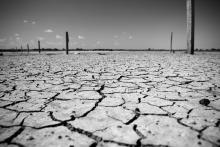
Climate change is about people, not just science and politics — it is an inter-generational ethics issue. The earth is the Lord’s, and in Genesis, God entrusts us with caring for Creation. The earth that we leave to future generations is already being changed by climate change, and so far, our nation has done little to stop climate pollution. The Clean Power Plan, announced Monday by the EPA, is a great step forward for our country in taking climate change seriously.
The policy will treat carbon the way it should be treated — as a pollutant that’s harming our health and our planet. It will reduce our carbon pollution 30 percent below 2005 levels by 2030, but will allow each state the flexibility to decide how it reaches that goal.
The rule reflects some of the best values we hold dear. It will help prevent premature deaths and asthma attacks caused by smog and other air pollutants. But most importantly, it will reduce the pollution that fuels climate change. It’s clear that President Obama cares about the legacy he leaves to today and into future generations. While there is a lot more that can and should be done by this administration and by Congress, President Obama deserves our appreciation for embracing the common good and taking such a big step to preserve the earth for our grandchildren’s grandchildren.
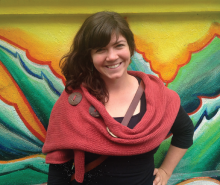
Bio:
Katerina Friesen is studying theology and peace studies at Anabaptist Mennonite Biblical Seminary in Elkhart, Ind.
1. How would you describe your current vocational role?
I see my role as both revaluing what has been cast down and degraded and building resilient communities. So far this has taken shape through land-based ministries of farming and community gardening, inviting people to work together and celebrate the sacramental in soil, food, and one another.
2. You spent several years with the Abundant Table Farm Project in Santa Paula, Calif. Can you describe the project and your role there?
The Abundant Table Farm Project is a working farm and young adult internship program that has evolved into a Christian community. I joined the project in 2009 and lived in community with four other women. My daily work of farming gave me a bodily understanding of farm workers’ labor and the need for justice and wholeness in our incredibly disconnected food system.